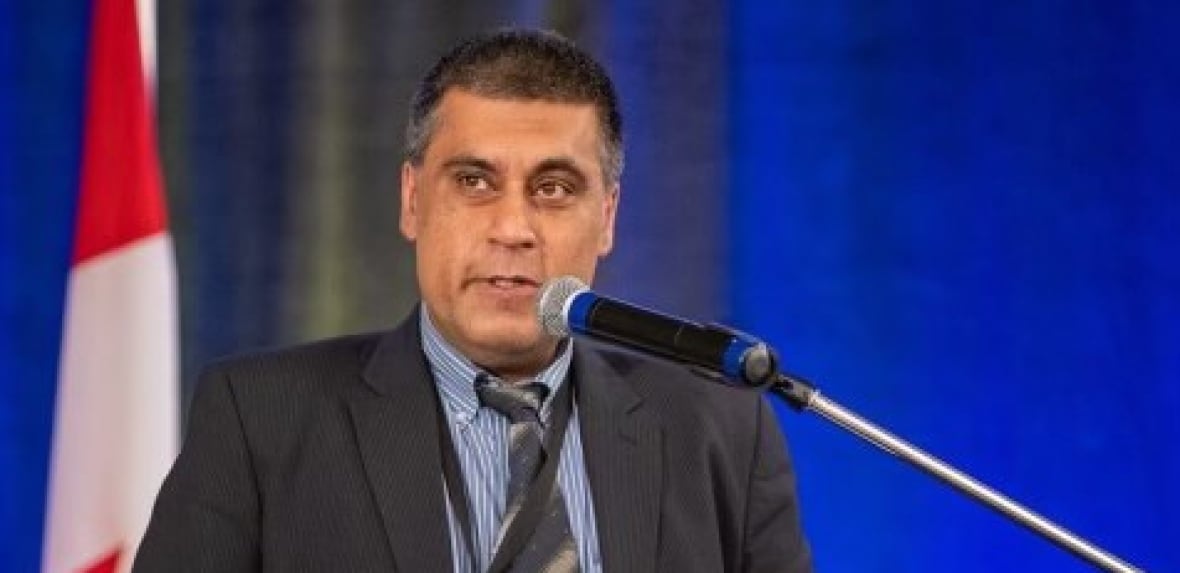N.B. immigrant says pursuit of permanent residency was risky without paying for help
In 'unforgiving' immigration climate, single mom Patricia Montiel spent $7,000 on her application

When Patricia Montiel decided she wanted to stay in Canada, she expected the pursuit of permanent residency would be straightforward.
Originally from Mexico, Montiel moved to Charlottetown to attend Holland College, where she studied tourism, travel, and event management. After her graduation, she and her two young daughters moved to Fredericton, looking to live in a bigger city with more employment opportunities.
She worked as an administrative assistant and a server part time, and she applied for permanent residency, believing that with enough work experience, she would qualify.
The process proved to be harder than she expected.
"At the beginning it was easy, or at least the idea of thinking of it was easy," Montiel said. "But through the way, things got a bit more complicated."
Before their temporary status ends, if immigrants fail to amass all the qualifications for the stream that matches their case, they could lose their status and have to return to their home country.
With the recent federal cuts to permanent residencies, Montiel said Canada's immigration process has become more competitive and complex.
Even though hiring legal help is not required, she felt it was necessary to improve her chances.
"We have invested a lot when we came to Canada," she said. "We have invested not only money. We have invested time, a lot of resources and even hopes.
"That's too much to risk."
Montiel said she spent about $5,000 on an immigration consultant and $2,000 more in processing fees to prepare and submit applications for herself and her two daughters.
The single mother said she spent her savings and used her credit cards to cover the remaining costs.
In May her permanent residency was approved.
Newcomers need more supports
Montiel's story comes as no surprise to Mohamed Bagha, managing director of the Saint John Newcomer Centre.
He said with the high demand for permanent residency and long processing times, immigrants don't have the space to make mistakes and are opting to pay for legal advice.
"We are seeing more and more newcomers who want to ensure they are filling out those immigration papers correctly," he said.
Bagha said that applying for permanent residency without legal guidance is still possible, but the changes in policy have created anxiety and uncertainty for immigrants who want to make Canada their home.
"You don't have multiple chances, and the timelines for processing are so high it's not like if you did a mistake you can correct it tomorrow," Bagha said.
Bagha has seen mistakes drag the application process to the point where applicants can lose their status.
To support newcomers, Bagha said the Saint John centre offers a referral system to connect immigrants with licensed legal professionals, including lawyers and immigration advisers, for their individual cases.

Additionally, it operates a legal clinic, providing free advice with the assistance of lawyers and law students.
Bagha said the centre would like to find more ways to support newcomers, especially those without the resources to hire legal advice, but it would need government support.
"We don't want to increase the precariousness of folks who are already vulnerable, of folks who contribute to our labour market, to our demographic challenges in smaller provinces."
Bagha said that the government should shift its "singular" view of immigration, and instead look at it from a holistic perspective that considers what immigrants can contribute to the country.
He believes that with adequate support and services, immigrants would find it easier to remain in New Brunswick and continue to contribute to its communities.
"Imagine if they had the ability, some of them who weren't able to complete those immigration forms, if they had services and the ability to do that, wouldn't New Brunswick be a better place?"
Ottawa says lawyers not required
Immigration, Refugee, and Citizenship Canada declined an interview request, but in an emailed statement, a spokesperson said applicants aren't required to hire lawyers.
"Applicants are free to use a representative but must be aware that this will not draw special attention to their application or guarantee approval," communications officer Matthew Krupovich wrote.
"Generally, if applicants follow the instructions, they should be able to fill out the forms and submit them themselves."
Kuprovich also explained that if applicants choose to use a paid representative, they must confirm they are authorized. If applicants use non-authorized paid representation their application may be refused or returned.
Kuprovich said the federal department tries to make as much information as possible available online.

Montiel said that the resources could be more comprehensive and accessible.
She found the information online to be general and not easily applied to individual cases.
Montiel also explained that the response times for the Immigration department's phone line and web forms are long, taking several weeks and even months to receive a reply.
Permanent residency process should be expedited
Like Bagha, Montiel said that it is possible for people to obtain their permanent residency without professional assistance.
Now that she has received her electronic confirmation her permanent residency has been approved, Montiel said she feels blessed, but she still believes that the process needs improvements.
She said she would like to see the processing times expedited.
With the changes in immigration streams to focus on economic immigration, some immigrants have struggled and have gotten "stuck" in the process.
"When someone is already following a path or is going to apply to that program and suddenly that program is closed, we don't have the time to take a different pathway," she said.
Montiel said people who want to make a life in Canada should not be discouraged by the competitive climate.
The process faced by Montiel
Montiel got her permanent residency through the express entry stream called Canadian experience class, a stream for skilled workers who have Canadian work experience.
To qualify, applicants need a year — 30 hours a week — of paid Canadian work experience under temporary resident status within the last three years. This experience must align with a national occupational classification job description.
Montiel was also nominated by the New Brunswick nominee program under the skilled worker stream.
This a regional program where immigrants can be nominated by Immigration N.B. based on their skills, work experience, and education, and a consideration of the province's economic needs.
According to Immigration N.B., a provincial nomination does not guarantee approval of permanent residency. The federal Immigration Department makes the final decision.
Immigrants can apply to different streams depending on the requirements.


